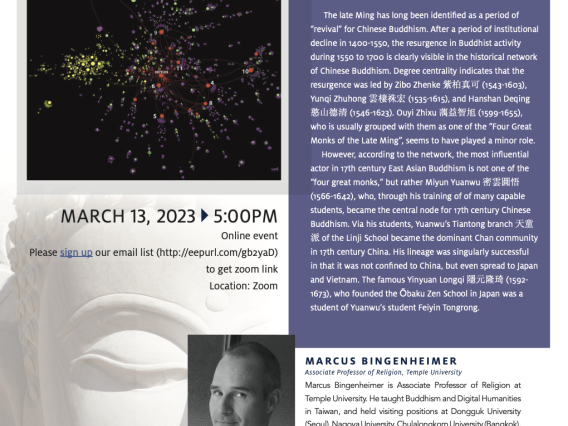
Dear Friends of the Center for Buddhist Studies,
Please join us on Monday, March 13 at 5 pm (Arizona Time) for the next lecture of the Ōbaku Ingen/Lingyin Lecture Series! This is an online event.
The year 2022 marked the 350th death anniversary of Zen Master Yinyuan Longqi (隱元隆琦1592-1673, Ingen Ryūki in Japanese). Special ceremonies and events are being held in both Japan and China to honor this great Zen master. In North America, the Center for Buddhist Studies, College of Humanities at the University of Arizona is organizing a series of commemorative events which will run for one year beginning May 3, 2022. These events will present and explore the extraordinary life of Zen Master Yinyuan and the great achievements of the Huangbo 黃檗Chan tradition (known as the Ōbaku school of Zen Buddhism in Japan) that Yinyuan pioneered in China and Japan. These events highlight the intersection between religion, art, and culture in China and Japan and will be presented in both online and offline formats. Activities will include an online exhibition of works of art related to the Ōbaku tradition, academic lectures, musical performances, and tea-related events. (Visit our Ōbaku Ingen website at: ingen.arizona.edu).
Time and Location:
Online event
March 13
Time: 5:00 pm - 6:30 pm (Arizona Time)
To receive a link to the webinar, please sign up for our email list here: http://eepurl.com/gb2yaD. If you are already on our list, please update your preference: go to your email inbox and find any of our emails you received before, then click the link to "update your preference" in the footer; select the group "Lectures and Academic Research" or "Ōbaku Ingen Events," you will receive an email of Zoom link soon. (See [Tutorial] How to Update Preferences for CBS Newsletter)
Talk title: A network perspective on the two stages of the late Ming revival of Chinese Buddhism
Speaker: Dr. Marcus Bingenheimer, Associate Professor of Religion, Temple University
Abstract:
The late Ming has long been identified as a period of "revival" for Chinese Buddhism. After a period of institutional decline from 1400-1550, the resurgence in Buddhist activity from 1550 to 1700 is clearly visible in the historical network of Chinese Buddhism. Degree centrality indicates that the resurgence was led by Zibo Zhenke 紫柏真可(1543-1603), Yunqi Zhuhong 雲棲祩宏 (1535-1615), and Hanshan Deqing 憨山德清 (1546–1623). Ouyi Zhixu 蕅益智旭 (1599-1655), who is usually grouped with them as one of the "Four Great Monks of the Late Ming," seems to have played a minor role.
However, all of the four "great monks" identified by historiography are somewhat set apart from the later region of the network that represents the Ming-Qing transition. The Wanli monks form a first stage, which is marked by a synthetic holistic approach to Buddhist practices, and a lack of interest in lineage. After the Wanli revival there was a second stage which emphasized traditional Chan monastic practice and lineage. Whereas the central players of the Wanli revival are more strongly connected with each other and backwards in time, the second stage is foundational to the generation of the Ming-Qing transition. According to the network the most influential actor in 17th century East Asian Buddhism is not one of the "four great monks," but rather Miyun Yuanwu 密雲圓悟 (1566-1642), who, through his training of many capable students, became the central node for 17th century Chinese Buddhism. Via his students, Yuanwu's Tiantong branch 天童派 of the Linji School became the dominant Chan community in 17th century China. Some 12 monks received full Dharma transmission from him, among them Feiyin Tongrong 費隱通容 (1593-1661), Hanyue Fazang 漢月法藏 (1573-1635), and Muchen Daomin 木陳道忞 (1596-1674).
His lineage was singularly successful in that it was not confined to China, but even spread to Japan and Vietnam. The famous Yinyuan Longqi 隱元隆琦 (1592-1673), who founded the Ōbaku Zen School in Japan, was a student of Yuanwu's student Feiyin Tongrong.
In Vietnam, Muchen Daomin’s student Kuangyuan Benguo 曠圓本果 (d.u.) transmitted Miyun's lineage to Yuanshao 元韶 (1648-1728), who eventually settled in Vietnam and became a prominent Buddhist leader there. The Nguyên-Thiêu lineage that began with Yuanshao is still one of the largest Vietnamese Chan lineages.
Speaker Bio:
Marcus Bingenheimer is Associate Professor of Religion at Temple University. He taught Buddhism and Digital Humanities in Taiwan, and held visiting positions at Dongguk University (Seoul), Nagoya University, Chulalongkorn University (Bangkok), the École Pratique des Hautes Études (Paris), Thammasat University (Bangkok), and the National University of Singapore. Since 2001, he has supervised numerous projects concerning the digitization of Buddhist culture. His main research interests are Buddhist history and historiography, early sūtra literature, and how to apply computational approaches to research in the Humanities. He has written and edited a handful of books and some sixty articles.
These lecture series are made possible thanks to the generous support from Wanfu Temple in Fuqing, Lingyin Temple in Hangzhou, and Matcha.com.
Please follow us on social media to receive future updates:
Facebook: Center for Buddhist Studies
Instagram: @UACBS
Twitter: @UACBSofficial
We look forward to seeing you there!


